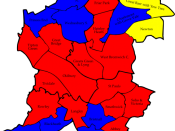Class voting is typical of what sociologists refer to as expressive voting. We all tend to identify ourselves as part of a particular group in society, which is made up of family, friends and colleagues. As we grow up within the society we are socialised to behave in particular ways, and the way we vote in elections is one aspect of this. If we see our selves as a member of the working class and believe that the Labour Party best represents the interests of our class, then we are likely to vote Labour in the general election. Since the 1970s, explanations of deviant voting have been more than ever called for. Voters are no longer so tied to the two-party model of part competition. The level of partisanship (voters who are loyal to a particular party) declined dramatically.
Before starting to discuss the extent to which social class continues to affect voting behaviour in Britain, I will define the meaning of 'Class'.
Defined in "The New British Politics', class is addressed in the following meaning;
"Among the many and varied definitions of class the most useful ranks the social land economic status of individuals according to their occupation, most notably into manual (working class) and non-manual (middle class) groups, and then into sub-groups or strata of these categories .
To explain if social class continues to affect voting behaviour in Britain, it is necessary to look at voting behaviour prior to the 1970s for effective comparison. Following the end of the WWII, voting behaviour was a predictable affair. The most common feature of voting at this time was Class Voting. This was the name given to the pattern of voting behaviour where the working class people (manual workers, blue collar) of the nation voted for Labour and the middle...


